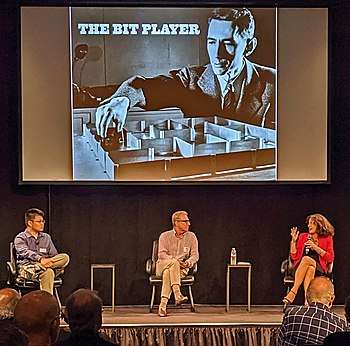Andrea Goldsmith (engineer)
Andrea Goldsmith is an American electrical engineer and the Stephen Harris Professor in the School of Engineering at Stanford University,[1] as well as a faculty affiliate at the Stanford Neurosciences Institute.[2] Her interests are in the design, analysis and fundamental performance limits of wireless systems and networks, and in the application of communication theory and signal processing to neuroscience.[3] She also co-founded and served as chief technology officer of Plume WiFi and Quantenna Communications. Goldsmith has been named as the incoming Dean of the School of Engineering and Applied Science at Princeton University, where she will also join the faculty as the Arthur LeGrand Doty Professor of Electrical Engineering. She will begin her appointment on Sep 1st, 2020.[4][5][6]
Andrea Goldsmith | |
|---|---|
| Nationality | American |
| Alma mater | University of California, Berkeley |
| Known for | Wireless communications |
| Awards |
|
| Scientific career | |
| Fields | Electrical engineering |
| Institutions | |
| Thesis | Design and Performance of High-Speed Communication Systems over Time-Varying Radio Channels |
| Doctoral advisor | Pravin Varaiya |
| Website | engineering |

Early life and education
Goldsmith was raised in the San Fernando Valley, California.[7] Her father Werner Goldsmith was a professor of mechanical engineering at UC Berkeley, and her mother Adrienne Goldsmith was an animator for cartoon shows including The Rocky and Bullwinkle Show.[8][9] Goldsmith earned her bachelor's degree in engineering math from the University of California, Berkeley, in 1986, and her MS and PhD in electrical engineering from UC Berkeley in 1991 and 1994, respectively.[7][9] In the years between obtaining her bachelor's and PhD, she spent four years as a systems engineer at a Silicon Valley defense communications startup.[7]
Work and academic career
Goldsmith started her academic career at the California Institute of Technology and was there for four years. She joined Stanford in 1999, becoming an associate professor in 2002 and a full professor in 2007.[7] At Stanford, she has served as chair of the faculty senate, and on the school's task force on women and leadership.[2] In 2006, she took a leave of absence from Stanford and co-founded Quantenna Communications, a company that produces silicon chipsets designed for high-speed, wireless high-definition video home networking. She served as chief technology officer of the startup until returning to Stanford in 2008.[7] She was also a founder and CTO of Plume WiFi, which was founded in 2014 and develops WiFi technology.[2]
As an inventor and consultant, she has secured 28 patents.[2][10] She has authored and co-authored several books, including Wireless Communication, MIMO Wireless Communications and Principles of Cognitive Radio.[2] She has launched and led several multi-university research projects, including DARPA's ITMANET program,[11] and she is a principal investigator in the National Science Foundation Center on the Science of Information.[12]
In the IEEE, Goldsmith served on the board of governors for both the Information Theory and Communications societies. She has also been a distinguished lecturer for both societies, served as president of the IEEE Information Theory Society in 2009, founded and chaired the Student Committee of the IEEE Information Theory society, and chaired the Emerging Technology Committee of the IEEE Communications Society. She chairs the IEEE Committee on Diversity and Inclusion.[13][14]
She won the 2017 Women in Communications Engineering Mentorship Award from the IEEE Communications Society for her efforts in encouraging women in the fields of technology and engineering.[14] In 2017, she was elected to the Academy of Arts and Sciences,[3] and also to the National Academy of Engineering.[2]
Awards
- National Academy of Engineering Gilbreth Lecture Award, 2002[15]
- Silicon Valley Business Journal Women of Influence Award, 2010[2][16]
- IEEE Communications Society Edwin H. Armstrong Achievement Award, 2014[2][17]
- Member, National Academy of Engineering, 2017–present[2]
- Member, American Academy of Arts and Sciences, 2017–present[3]
- Women in Communications Engineering (WICE) Mentorship Award, 2017[14]
- ACM Athena Lecturer Award, 2018[18]
- Marconi Prize, 2020[19]
Publications
Books and book chapters
- Entropy, Mutual Information, and Capacity for Markov Channels with General Inputs, T. Holliday, A. Goldsmith, P. Glynn, Stanford University Press, 2002
- EE359 Wireless Communications, A. Goldsmith, Stanford University Press, 2002
- Wireless Communications, A. Goldsmith, Cambridge University Press, 2005
- MIMO Wireless Communications, E. Biglieri, Cambridge University Press, 2007
- Principles of Cognitive Radio, A. Goldsmith, L. Greenstein, N. Mandayam, H.V. Poor, Cambridge University Press, 2012
Personal life
Goldsmith lives in Menlo Park, California, with her husband, scientist Arturo Salz, and their children.[7][9]
External links
References
- "Andrea Goldsmith". stanford.edu. Archived from the original on April 30, 2019. Retrieved November 27, 2017.
- Sarah Wishingrad, "Three Stanford professors elected to National Academy of Engineering," The Stanford Daily, March 6, 2017.
- Kate Chesley, "American Academy of Arts and Sciences elects 11 Stanford faculty members," Stanford News, April 12, 2017.
- https://www.princeton.edu/news/2020/04/15/andrea-goldsmith-entrepreneur-and-leader-wireless-communications-appointed
- https://www.dailyprincetonian.com/article/2020/04/appoints-new-dean-of-engineering-school-princeton
- https://paw.princeton.edu/article/andrea-goldsmith-named-new-dean-engineering
- Kathleen J. Sullivan, "Wireless communications expert takes the helm of the Faculty Senate," Stanford News, October 22, 2009.
- Jim Herron Zamora, "Werner Goldsmith – expert on head injuries," San Francisco Chronicle, September 3, 2003.
- Abra Cohen, "Talking with a wizard in the field of wireless," J Weekly, March 7, 2014.
- "Stanford Engineering: Andrea Goldsmith". Stanford University. Retrieved 25 April 2017.
- ITMANET, Cognition & Control in Complex Systems, 2011.
- Andrea Goldsmith, Center for Science of Information, September 8, 2015.
- Andrea Goldsmith, IEEE Information Theory Society. Accessed May 2, 2018.
- Vicky Stein, "Andrea Goldsmith wins award for mentoring women in engineering," Stanford News, October 30, 2017.
- Armstrong Endowment for Young Engineers - Gilbreth Lectures, NAE. Accessed May 2, 2018.
- "2010 Women of Influence," Silicon Valley Business Journal, 2010.
- "IEEE Communications Society Edwin Howard Armstrong Achievement Award," IEEE ComSoc. Retrieved May 2, 2018.
- ACM Athena Lecturer Award, USA, Association for Computing Machinery, 2018.
- Marconi Prize 2020